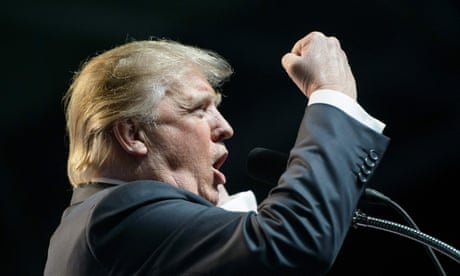Trump won because he unashamedly stood as the champion of the dispossessed. More than the 16 Republican rivals he left in his wake, and more than the Democratic party standard-bearer he defeated, he led the cry of those who felt they had been left behind by globalisation. He channelled and inflamed inchoate anger, inflamed racial divisions and exploited a sense of burning injustice at a system “rigged” against the little guy. He was the self-styled winner who knew how to play the system, the strong man who alone could fix it.

To Trump, as to the Brexiteers, the enemy was the outsider: the Mexicans, the Chinese (the biggest “theft” in human history), Muslims, even Nato allies. His economic and security messages melded together: it was time to circle the wagons, to put America and Americans first. Trump won because he offered what seemed to the ears of many a plausible narrative about the failures of US economic policy that left so many behind– failures stretching back three decades before the collapse of the economy in 2008.
But while he was forceful about the consequences of a sick economy, his diagnosis could not be more wrong. He won by blaming external forces, trade and immigration. The truth lies much closer to home. It is the actions of US businesses, like his own, that lie behind the failure of the economy to deliver rising living standards for ordinary Americans. They have made money by extracting value, not creating it. And the problem has only become worse since the 2008 crisis.
The shareholder value revolution of the 80s created a corporate governance model that rewards quarterly returns over investments in the productive capacity of companies. Companies increasingly spend their profits, now at record levels, on buying back shares in order to boost stock prices, stock options and executive pay. This has led to a financialised economy, which many of Trump’s policies – including a lowering of corporate income tax – will only worsen.
Until the 80s, wages kept up with productivity, but since then they haven’t, and unions have weakened. As wages failed to keep pace with living costs, personal debt increased to cover the gap.
This rise in personal indebtedness has given life to new types of financial instruments that suck blood out of the system, leading to an increasingly financialised economy. The growth in size of financial intermediation as a percentage of GDP has outpaced growth in the rest of the economy.
The globalisation of capital (in contrast to labour) has meant that when growth falters capital can go elsewhere. Indeed, Trump’s behaviour – setting up businesses, letting them fail, avoiding paying suppliers, using bankruptcy laws to avoid taxes for decades, then setting up another business somewhere else – is the perfect symbol of this asset-stripping form of capitalism.
It is this breaking of the unwritten contract between capital and labour – that is, the sense of shared purpose and shared reward between the American worker and his or her employer and an associated failure to support American workers as they adapt to structural and technological changes - that lies at the heart of the problem. It is not the robots that are the enemy.
The reckoning that should have happened in 2008 never came. Not enough has been done to reform the model of capitalism which is itself responsible for Trump’s rise. We can only hope that his election will finally open the eyes of his opponents as to why new ideas are needed.
For this is not the only way. Trump sees the role of the state as limited to protectionism and funding basics like infrastructure, but what is needed is a much more active state, able to address societal problems through investments in innovation, in order to stimulate private investment and give direction to growth.
We need a decisive shift towards investment-driven growth, replacing the current consumer-driven, credit-fuelled model which adds to the stress of the most vulnerable. Tackling inequality should be a central objective of economic policy, for economic reasons every bit as much as social reasons. We must reconnect the company with society, and instil a sense of broader obligation, rewarding value creation over value extraction. In other countries such as Germany and Scandinavia a more participatory form of stakeholder capitalism gives workers a role on company boards.
Trumpism might be a uniquely American political expression, but the dysfunctions in American capitalism that have given rise to it are not. Though the specifics of the solutions may differ, European models of capitalism have many of the same fissures. Now, more than ever, Europe must find its own distinct language and policies if we are to solve the political, social and economic crisis on this side of the Atlantic .